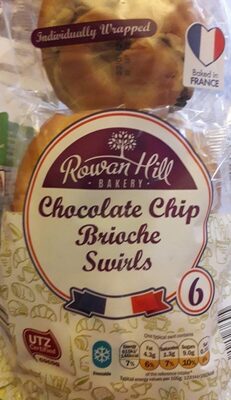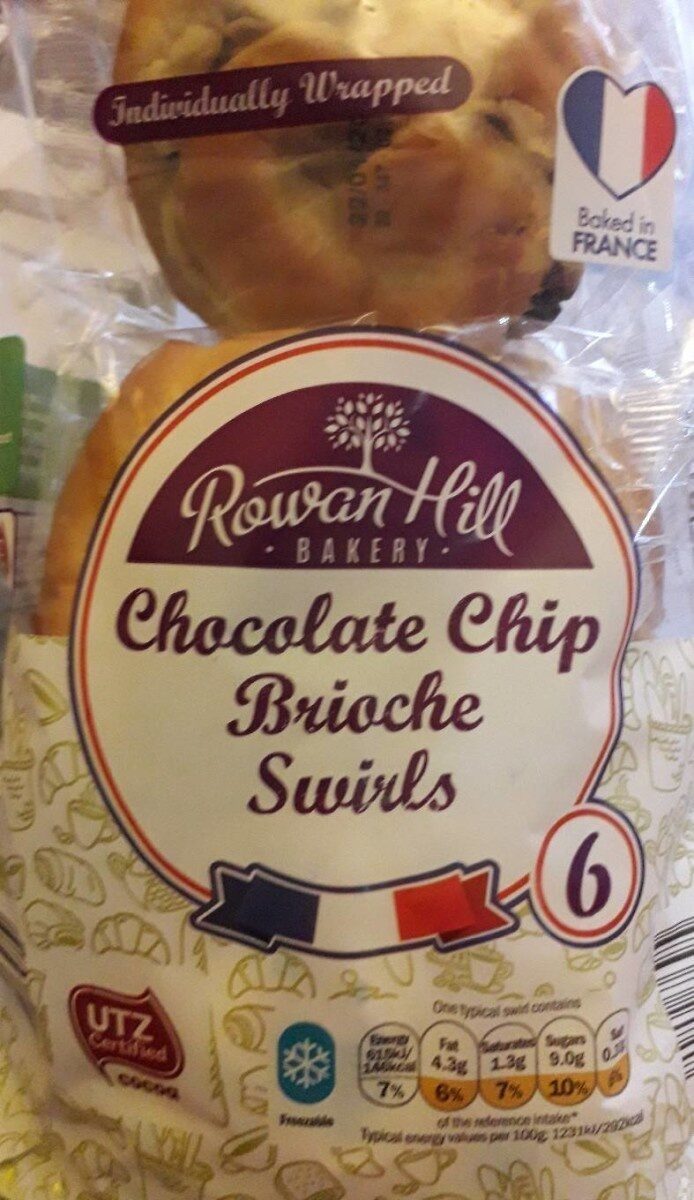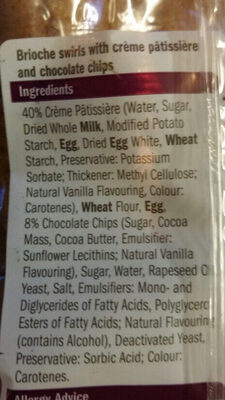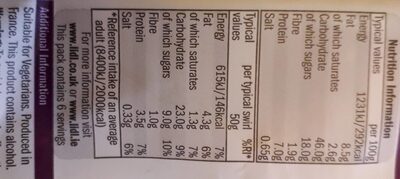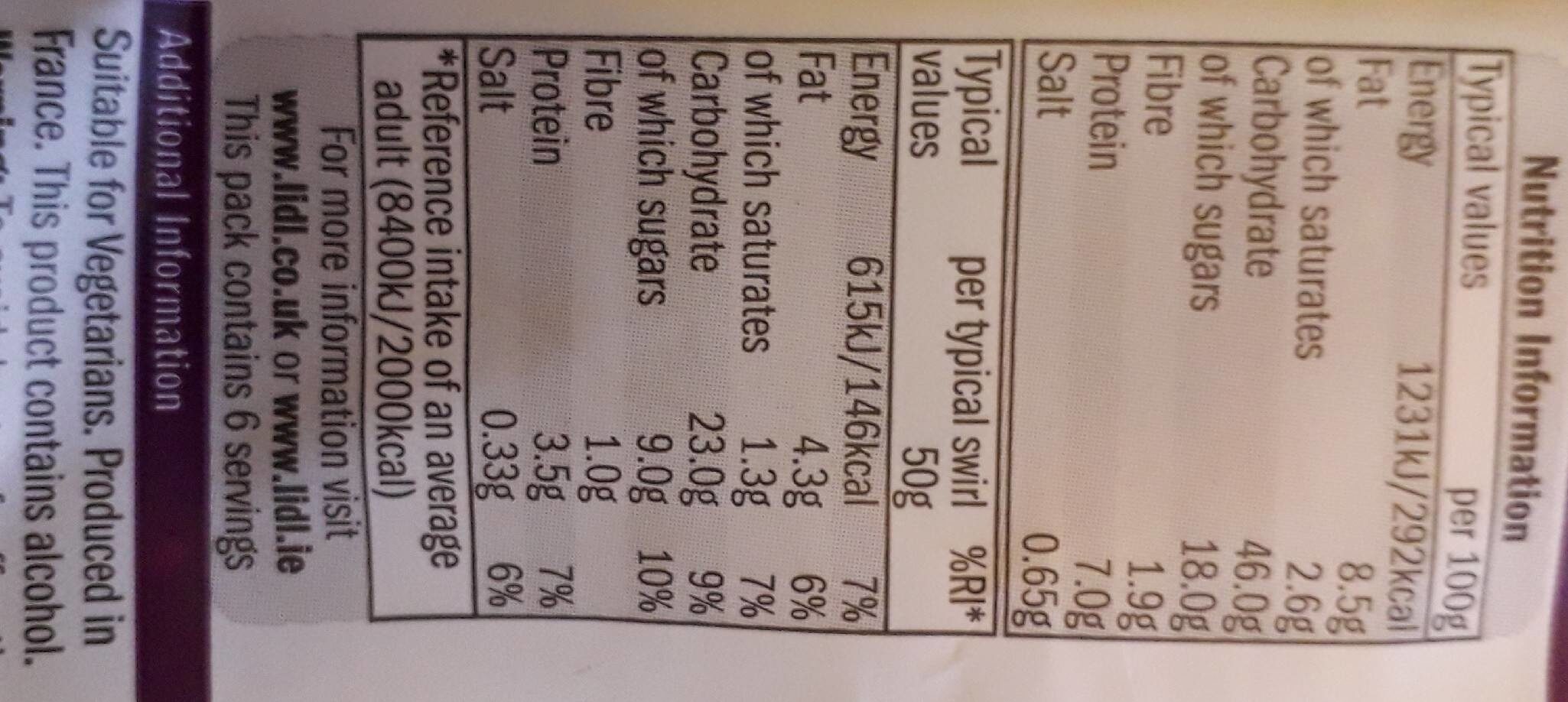Help us make food transparency the norm!
As a non-profit organization, we depend on your donations to continue informing consumers around the world about what they eat.
The food revolution starts with you!
Chocolate chip brioche swirls ( pack of 6 ) - Lidl
Chocolate chip brioche swirls ( pack of 6 ) - Lidl
Ambiguous barcode: This product has a Restricted Circulation Number barcode for products within a company. This means that different producers and stores can use the same barcode for different products.
×
This product page is not complete. You can help to complete it by editing it and adding more data from the photos we have, or by taking more photos using the app for Android or iPhone/iPad. Thank you!
×
Barcode: 20297695
Brands: Lidl
Categories: Snacks, Sweet snacks, Sweet pastries and pies, Viennoiseries, Brioches
Labels, certifications, awards:
Sustainable farming, UTZ Certified, UTZ Certified Cocoa
Stores: Lidl
Countries where sold: United Kingdom
Matching with your preferences
Health
Ingredients
-
36 ingredients
Brioche swirls with crème pâtissière and chocolate chips Ingredients 40% Crème Pâtissière (Water, Sugar, Dried Whole Milk, Modified Potato Starch, Egg, Dried Egg White, Wheat Starch, Preservative: Potassium Sorbate; Thickener: Methyl Cellulose; Natural Vanilla Flavouring, Colour: Carotenes), Wheat Flour, Egg 8% Chocolate Chips (Sugar, Cocoa Mass, Cocoa Butter, Emulsifier: Sunflower Lecithins; Natural Vanilla Flavouring), Sugar, Water, Rapeseed O Yeast,Salt, Emulsifiers: Mono - and Diglycerides of Fatty Acids, Polyglycero Esters of Fatty Acids; Natural Flavourin (contains Alcohol), Deactivated Yeast Preservative:Sorbic Acid; Colour: Carotenes. Allormy AdviceAllergens: Eggs, Gluten, Milk
Food processing
-
Ultra processed foods
Elements that indicate the product is in the 4 - Ultra processed food and drink products group:
- Additive: E160a - Carotene
- Additive: E322 - Lecithins
- Additive: E461 - Methyl cellulose
- Additive: E471 - Mono- and diglycerides of fatty acids
- Ingredient: Colour
- Ingredient: Emulsifier
- Ingredient: Flavouring
- Ingredient: Thickener
Food products are classified into 4 groups according to their degree of processing:
- Unprocessed or minimally processed foods
- Processed culinary ingredients
- Processed foods
- Ultra processed foods
The determination of the group is based on the category of the product and on the ingredients it contains.
Additives
-
E160a - Carotene
Carotene: The term carotene -also carotin, from the Latin carota, "carrot"- is used for many related unsaturated hydrocarbon substances having the formula C40Hx, which are synthesized by plants but in general cannot be made by animals -with the exception of some aphids and spider mites which acquired the synthesizing genes from fungi-. Carotenes are photosynthetic pigments important for photosynthesis. Carotenes contain no oxygen atoms. They absorb ultraviolet, violet, and blue light and scatter orange or red light, and -in low concentrations- yellow light. Carotenes are responsible for the orange colour of the carrot, for which this class of chemicals is named, and for the colours of many other fruits, vegetables and fungi -for example, sweet potatoes, chanterelle and orange cantaloupe melon-. Carotenes are also responsible for the orange -but not all of the yellow- colours in dry foliage. They also -in lower concentrations- impart the yellow coloration to milk-fat and butter. Omnivorous animal species which are relatively poor converters of coloured dietary carotenoids to colourless retinoids have yellowed-coloured body fat, as a result of the carotenoid retention from the vegetable portion of their diet. The typical yellow-coloured fat of humans and chickens is a result of fat storage of carotenes from their diets. Carotenes contribute to photosynthesis by transmitting the light energy they absorb to chlorophyll. They also protect plant tissues by helping to absorb the energy from singlet oxygen, an excited form of the oxygen molecule O2 which is formed during photosynthesis. β-Carotene is composed of two retinyl groups, and is broken down in the mucosa of the human small intestine by β-carotene 15‚15'-monooxygenase to retinal, a form of vitamin A. β-Carotene can be stored in the liver and body fat and converted to retinal as needed, thus making it a form of vitamin A for humans and some other mammals. The carotenes α-carotene and γ-carotene, due to their single retinyl group -β-ionone ring-, also have some vitamin A activity -though less than β-carotene-, as does the xanthophyll carotenoid β-cryptoxanthin. All other carotenoids, including lycopene, have no beta-ring and thus no vitamin A activity -although they may have antioxidant activity and thus biological activity in other ways-. Animal species differ greatly in their ability to convert retinyl -beta-ionone- containing carotenoids to retinals. Carnivores in general are poor converters of dietary ionone-containing carotenoids. Pure carnivores such as ferrets lack β-carotene 15‚15'-monooxygenase and cannot convert any carotenoids to retinals at all -resulting in carotenes not being a form of vitamin A for this species-; while cats can convert a trace of β-carotene to retinol, although the amount is totally insufficient for meeting their daily retinol needs.Source: Wikipedia
-
E200 - Sorbic acid
Sorbic acid: Sorbic acid, or 2‚4-hexadienoic acid, is a natural organic compound used as a food preservative. It has the chemical formula CH3-CH-4CO2H. It is a colourless solid that is slightly soluble in water and sublimes readily. It was first isolated from the unripe berries of the Sorbus aucuparia -rowan tree-, hence its name.Source: Wikipedia
-
E202 - Potassium sorbate
Potassium sorbate (E202) is a synthetic food preservative commonly used to extend the shelf life of various food products.
It works by inhibiting the growth of molds, yeast, and some bacteria, preventing spoilage. When added to foods, it helps maintain their freshness and quality.
Some studies have shown that when combined with nitrites, potassium sorbate have genotoxic activity in vitro. However, potassium sorbate is generally recognized as safe (GRAS) by regulatory authorities.
-
E322 - Lecithins
Lecithins are natural compounds commonly used in the food industry as emulsifiers and stabilizers.
Extracted from sources like soybeans and eggs, lecithins consist of phospholipids that enhance the mixing of oil and water, ensuring smooth textures in various products like chocolates, dressings, and baked goods.
They do not present any known health risks.
-
E461 - Methyl cellulose
Methyl cellulose: Methyl cellulose -or methylcellulose- is a chemical compound derived from cellulose. It is a hydrophilic white powder in pure form and dissolves in cold -but not in hot- water, forming a clear viscous solution or gel. It is sold under a variety of trade names and is used as a thickener and emulsifier in various food and cosmetic products, and also as a treatment of constipation. Like cellulose, it is not digestible, not toxic, and not an allergen.Source: Wikipedia
-
E471 - Mono- and diglycerides of fatty acids
Mono- and diglycerides of fatty acids (E471), are food additives commonly used as emulsifiers in various processed foods.
These compounds consist of glycerol molecules linked to one or two fatty acid chains, which help stabilize and blend water and oil-based ingredients. E471 enhances the texture and shelf life of products like margarine, baked goods, and ice cream, ensuring a smooth and consistent texture.
It is generally considered safe for consumption within established regulatory limits.
-
E570 - Fatty acids
Fatty acid: In chemistry, particularly in biochemistry, a fatty acid is a carboxylic acid with a long aliphatic chain, which is either saturated or unsaturated. Most naturally occurring fatty acids have an unbranched chain of an even number of carbon atoms, from 4 to 28. Fatty acids are usually not found per se in organisms, but instead as three main classes of esters: triglycerides, phospholipids, and cholesterol esters. In any of these forms, fatty acids are both important dietary sources of fuel for animals and they are important structural components for cells.Source: Wikipedia
Ingredients analysis
-
May contain palm oil
Ingredients that may contain palm oil: E160a, E471, E160a
-
Non-vegan
Non-vegan ingredients: Whole milk powder, Egg, Egg whiteSome ingredients could not be recognized.
We need your help!
You can help us recognize more ingredients and better analyze the list of ingredients for this product and others:
- Edit this product page to correct spelling mistakes in the ingredients list, and/or to remove ingredients in other languages and sentences that are not related to the ingredients.
- Add new entries, synonyms or translations to our multilingual lists of ingredients, ingredient processing methods, and labels.
If you would like to help, join the #ingredients channel on our Slack discussion space and/or learn about ingredients analysis on our wiki. Thank you!
-
Vegetarian status unknown
Unrecognized ingredients: Brioche-swirls-with-creme-patissiere-and-chocolate-chips-ingredients-40-creme-patissiere, Egg-8-chocolate-chips, Rapeseed-o-yeast, Polyglycero-esters-of-fatty-acids, Natural-flavourin, Deactivated-yeast-preservative, Allormy-adviceSome ingredients could not be recognized.
We need your help!
You can help us recognize more ingredients and better analyze the list of ingredients for this product and others:
- Edit this product page to correct spelling mistakes in the ingredients list, and/or to remove ingredients in other languages and sentences that are not related to the ingredients.
- Add new entries, synonyms or translations to our multilingual lists of ingredients, ingredient processing methods, and labels.
If you would like to help, join the #ingredients channel on our Slack discussion space and/or learn about ingredients analysis on our wiki. Thank you!
-
Details of the analysis of the ingredients
We need your help!
Some ingredients could not be recognized.
We need your help!
You can help us recognize more ingredients and better analyze the list of ingredients for this product and others:
- Edit this product page to correct spelling mistakes in the ingredients list, and/or to remove ingredients in other languages and sentences that are not related to the ingredients.
- Add new entries, synonyms or translations to our multilingual lists of ingredients, ingredient processing methods, and labels.
If you would like to help, join the #ingredients channel on our Slack discussion space and/or learn about ingredients analysis on our wiki. Thank you!
: Brioche swirls with crème pâtissière and chocolate chips Ingredients 40% Crème Pâtissière (Water, Sugar, Dried Whole Milk, Modified Potato Starch, Egg, Egg White, Wheat Starch, Preservative (Potassium Sorbate), Thickener (Methyl Cellulose), Natural Vanilla Flavouring, Colour (Carotenes)), Wheat Flour, Egg 8% Chocolate Chips (Sugar, Cocoa Mass, Cocoa Butter, Emulsifier (Sunflower Lecithins), Natural Vanilla Flavouring), Sugar, Water, Rapeseed O Yeast, Salt, Emulsifiers (mono- and Diglycerides of Fatty Acids), Polyglycero Esters of Fatty Acids, Natural Flavourin, Deactivated Yeast Preservative (Sorbic Acid), Colour (Carotenes, Allormy Advice)- Brioche swirls with crème pâtissière and chocolate chips Ingredients 40% Crème Pâtissière -> en:brioche-swirls-with-creme-patissiere-and-chocolate-chips-ingredients-40-creme-patissiere - percent_min: 8.33333333333333 - percent_max: 100
- Water -> en:water - vegan: yes - vegetarian: yes - ciqual_food_code: 18066 - percent_min: 0.757575757575758 - percent_max: 100
- Sugar -> en:sugar - vegan: yes - vegetarian: yes - ciqual_proxy_food_code: 31016 - percent_min: 0 - percent_max: 18
- Dried Whole Milk -> en:whole-milk-powder - vegan: no - vegetarian: yes - ciqual_food_code: 19021 - percent_min: 0 - percent_max: 18
- Modified Potato Starch -> en:modified-potato-starch - vegan: yes - vegetarian: yes - ciqual_proxy_food_code: 9510 - percent_min: 0 - percent_max: 18
- Egg -> en:egg - vegan: no - vegetarian: yes - ciqual_food_code: 22000 - percent_min: 0 - percent_max: 18
- Egg White -> en:egg-white - vegan: no - vegetarian: yes - ciqual_food_code: 22001 - percent_min: 0 - percent_max: 16.6666666666667
- Wheat Starch -> en:wheat-starch - vegan: yes - vegetarian: yes - ciqual_proxy_food_code: 9510 - percent_min: 0 - percent_max: 14.2857142857143
- Preservative -> en:preservative - percent_min: 0 - percent_max: 12.5
- Potassium Sorbate -> en:e202 - vegan: yes - vegetarian: yes - percent_min: 0 - percent_max: 12.5
- Thickener -> en:thickener - percent_min: 0 - percent_max: 11.1111111111111
- Methyl Cellulose -> en:e461 - vegan: yes - vegetarian: yes - percent_min: 0 - percent_max: 11.1111111111111
- Natural Vanilla Flavouring -> en:natural-vanilla-flavouring - vegan: yes - vegetarian: yes - percent_min: 0 - percent_max: 5
- Colour -> en:colour - percent_min: 0 - percent_max: 5
- Carotenes -> en:e160a - vegan: maybe - vegetarian: maybe - from_palm_oil: maybe - percent_min: 0 - percent_max: 5
- Wheat Flour -> en:wheat-flour - vegan: yes - vegetarian: yes - ciqual_proxy_food_code: 9410 - percent_min: 0 - percent_max: 50
- Egg 8% Chocolate Chips -> en:egg-8-chocolate-chips - percent_min: 0 - percent_max: 33.3333333333333
- Sugar -> en:sugar - vegan: yes - vegetarian: yes - ciqual_proxy_food_code: 31016 - percent_min: 0 - percent_max: 18
- Cocoa Mass -> en:cocoa-paste - vegan: yes - vegetarian: yes - ciqual_proxy_food_code: 16030 - percent_min: 0 - percent_max: 16.6666666666667
- Cocoa Butter -> en:cocoa-butter - vegan: yes - vegetarian: yes - ciqual_food_code: 16030 - percent_min: 0 - percent_max: 11.1111111111111
- Emulsifier -> en:emulsifier - percent_min: 0 - percent_max: 8.33333333333333
- Sunflower Lecithins -> en:sunflower-lecithin - vegan: yes - vegetarian: yes - percent_min: 0 - percent_max: 8.33333333333333
- Natural Vanilla Flavouring -> en:natural-vanilla-flavouring - vegan: yes - vegetarian: yes - percent_min: 0 - percent_max: 6.66666666666667
- Sugar -> en:sugar - vegan: yes - vegetarian: yes - ciqual_proxy_food_code: 31016 - percent_min: 0 - percent_max: 18
- Water -> en:water - vegan: yes - vegetarian: yes - ciqual_food_code: 18066 - percent_min: 0 - percent_max: 18
- Rapeseed O Yeast -> en:rapeseed-o-yeast - percent_min: 0 - percent_max: 16.6666666666667
- Salt -> en:salt - vegan: yes - vegetarian: yes - ciqual_food_code: 11058 - percent_min: 0 - percent_max: 0.65
- Emulsifiers -> en:emulsifier - percent_min: 0 - percent_max: 0.65
- mono- and Diglycerides of Fatty Acids -> en:e471 - vegan: maybe - vegetarian: maybe - from_palm_oil: maybe - percent_min: 0 - percent_max: 0.65
- Polyglycero Esters of Fatty Acids -> en:polyglycero-esters-of-fatty-acids - percent_min: 0 - percent_max: 0.65
- Natural Flavourin -> en:natural-flavourin - labels: en:contains-alcohol - percent_min: 0 - percent_max: 0.65
- Deactivated Yeast Preservative -> en:deactivated-yeast-preservative - percent_min: 0 - percent_max: 0.65
- Sorbic Acid -> en:e200 - vegan: yes - vegetarian: yes - percent_min: 0 - percent_max: 0.65
- Colour -> en:colour - percent_min: 0 - percent_max: 0.65
- Carotenes -> en:e160a - vegan: maybe - vegetarian: maybe - from_palm_oil: maybe - percent_min: 0 - percent_max: 0.65
- Allormy Advice -> en:allormy-advice - percent_min: 0 - percent_max: 0.325
Nutrition
-
Average nutritional quality
⚠ ️Warning: the amount of fruits, vegetables and nuts is not specified on the label, it was estimated from the list of ingredients: 0This product is not considered a beverage for the calculation of the Nutri-Score.
Positive points: 5
- Proteins: 4 / 5 (value: 7, rounded value: 7)
- Fiber: 1 / 5 (value: 1.9, rounded value: 1.9)
- Fruits, vegetables, nuts, and colza/walnut/olive oils: 0 / 5 (value: 0, rounded value: 0)
Negative points: 10
- Energy: 3 / 10 (value: 1222, rounded value: 1222)
- Sugars: 3 / 10 (value: 18, rounded value: 18)
- Saturated fat: 2 / 10 (value: 2.6, rounded value: 2.6)
- Sodium: 2 / 10 (value: 260, rounded value: 260)
The points for proteins are counted because the negative points are less than 11.
Nutritional score: (10 - 5)
Nutri-Score:
-
Nutrient levels
-
Fat in moderate quantity (8.5%)
What you need to know- A high consumption of fat, especially saturated fats, can raise cholesterol, which increases the risk of heart diseases.
Recommendation: Limit the consumption of fat and saturated fat- Choose products with lower fat and saturated fat content.
-
Saturated fat in moderate quantity (2.6%)
What you need to know- A high consumption of fat, especially saturated fats, can raise cholesterol, which increases the risk of heart diseases.
Recommendation: Limit the consumption of fat and saturated fat- Choose products with lower fat and saturated fat content.
-
Sugars in high quantity (18%)
What you need to know- A high consumption of sugar can cause weight gain and tooth decay. It also augments the risk of type 2 diabetes and cardio-vascular diseases.
Recommendation: Limit the consumption of sugar and sugary drinks- Sugary drinks (such as sodas, fruit beverages, and fruit juices and nectars) should be limited as much as possible (no more than 1 glass a day).
- Choose products with lower sugar content and reduce the consumption of products with added sugars.
-
Salt in moderate quantity (0.65%)
What you need to know- A high consumption of salt (or sodium) can cause raised blood pressure, which can increase the risk of heart disease and stroke.
- Many people who have high blood pressure do not know it, as there are often no symptoms.
- Most people consume too much salt (on average 9 to 12 grams per day), around twice the recommended maximum level of intake.
Recommendation: Limit the consumption of salt and salted food- Reduce the quantity of salt used when cooking, and don't salt again at the table.
- Limit the consumption of salty snacks and choose products with lower salt content.
-
-
Nutrition facts
Nutrition facts As sold
for 100 g / 100 mlCompared to: Brioches Energy 1,222 kj
(292 kcal)-22% Fat 8.5 g -44% Saturated fat 2.6 g -70% Carbohydrates 46 g -10% Sugars 18 g -20% Fiber 1.9 g -7% Proteins 7 g -3% Salt 0.65 g +11% Fruits‚ vegetables‚ nuts and rapeseed‚ walnut and olive oils (estimate from ingredients list analysis) 0 %
Environment
-
Eco-Score C - Moderate environmental impact
⚠ ️Select a country in order to include the full impact of transportation.The Eco-Score is an experimental score that summarizes the environmental impacts of food products.→ The Eco-Score was initially developped for France and it is being extended to other European countries. The Eco-Score formula is subject to change as it is regularly improved to make it more precise and better suited to each country.Life cycle analysis
-
Average impact of products of the same category: B (Score: 64/100)
Category: Brioche
Category: Brioche
- PEF environmental score: 0.39 (the lower the score, the lower the impact)
- including impact on climate change: 3.37 kg CO2 eq/kg of product
Stage Impact Agriculture
78.2 %Processing
12.8 %Packaging
6.1 %Transportation
2.7 %Distribution
0.2 %Consumption
0.0 %
Bonuses and maluses
-
Missing origins of ingredients information
Malus: -5
⚠ ️ The origins of the ingredients of this product are not indicated.
If they are indicated on the packaging, you can modify the product sheet and add them.
If you are the manufacturer of this product, you can send us the information with our free platform for producers.
-
Missing packaging information for this product
Malus: -15
⚠ ️ The information about the packaging of this product is not filled in.⚠ ️ For a more precise calculation of the Eco-Score, you can modify the product page and add them.
If you are the manufacturer of this product, you can send us the information with our free platform for producers.
Eco-Score for this product
-
Impact for this product: C (Score: 54/100)
Product: Chocolate chip brioche swirls ( pack of 6 ) - Lidl
Life cycle analysis score: 64
Sum of bonuses and maluses: -10
Final score: 54/100
-
Carbon footprint
-
Equal to driving 1.7 km in a petrol car
337 g CO² per 100g of product
The carbon emission figure comes from ADEME's Agribalyse database, for the category: Brioche (Source: ADEME Agribalyse Database)
Stage Impact Agriculture
77.4 %Processing
10.2 %Packaging
8.4 %Transportation
3.9 %Distribution
0.1 %Consumption
0.0 %
Packaging
-
Missing packaging information for this product
⚠ ️ The information about the packaging of this product is not filled in.Take a photo of the recycling information Take a photo of the recycling information
Transportation
-
Origins of ingredients
Missing origins of ingredients information
⚠ ️ The origins of the ingredients of this product are not indicated.
If they are indicated on the packaging, you can modify the product sheet and add them.
If you are the manufacturer of this product, you can send us the information with our free platform for producers.Add the origins of ingredients for this product Add the origins of ingredients for this product
Labels
Report a problem
-
Incomplete or incorrect information?
Category, labels, ingredients, allergens, nutritional information, photos etc.
If the information does not match the information on the packaging, please complete or correct it. Open Food Facts is a collaborative database, and every contribution is useful for all.
Data sources
Product added on by openfoodfacts-contributors
Last edit of product page on by itsjustruby.
Product page also edited by kiliweb, roboto-app, teolemon, yuka.R3FjdFBwOFQrdjBEZ3NCaDVBdkY1dkJZbjVpUFgwMklBczBhSVE9PQ, yuka.sY2b0xO6T85zoF3NwEKvlhBLDufM_C_vaQ3ioFOTn-mwLprPWddO7KreKKg.
